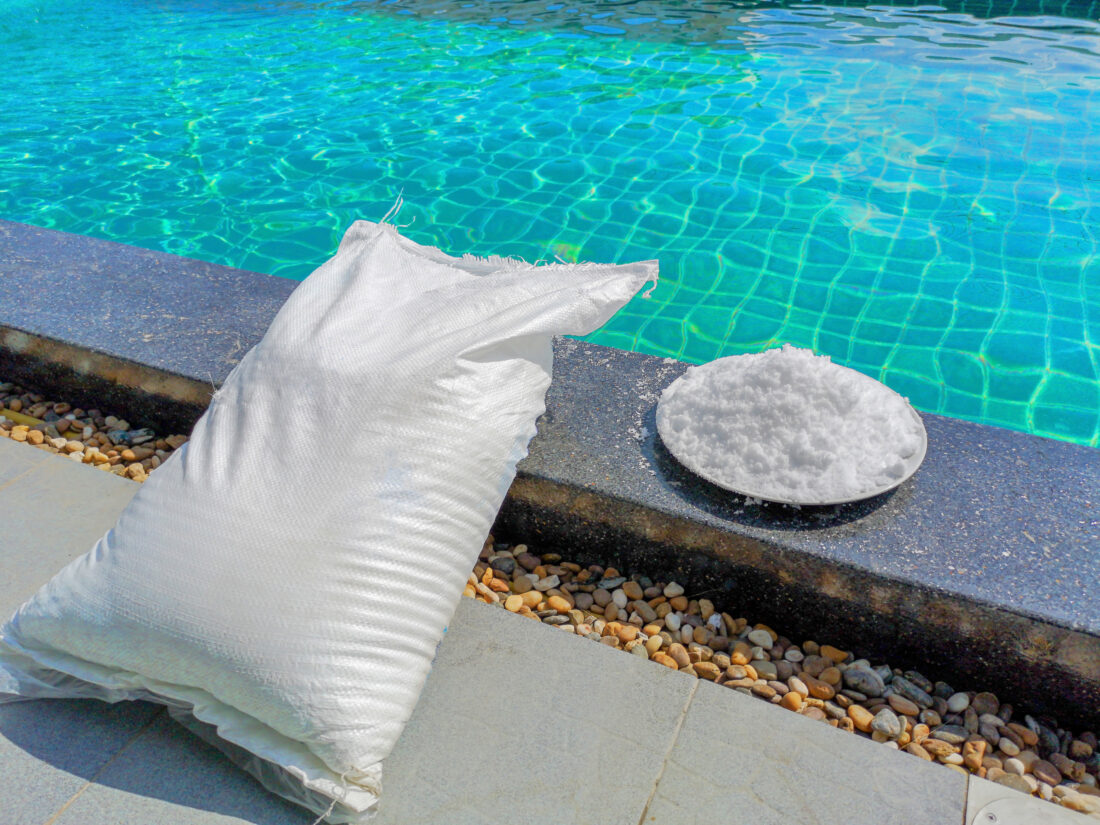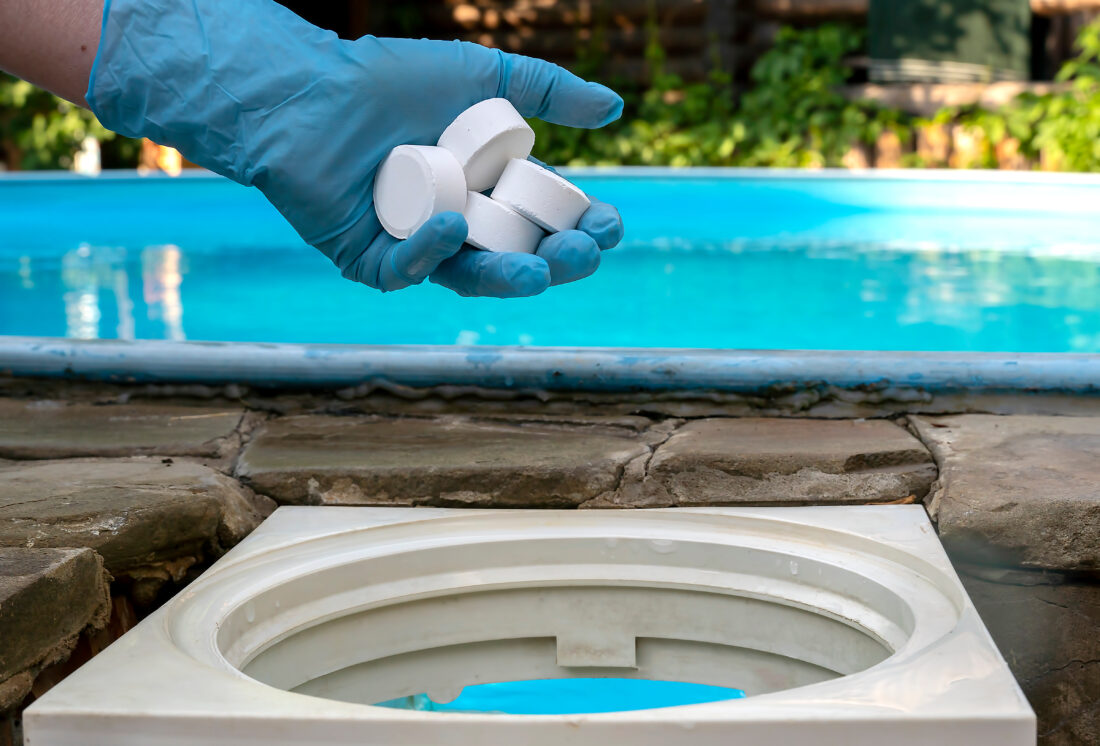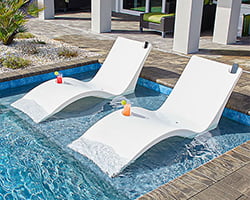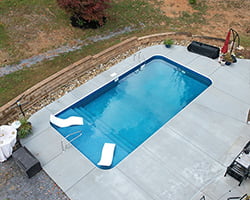There is a wide range of options available for those seeking either an in-ground or above ground swimming pool. Both saltwater and chlorine pools provide advantages. And both can be equally enjoyable.

How Do Salt Pools Work?
Although you may be familiar with the concept of saltwater pools, many people are unaware of how they actually operate. Despite their name, saltwater pools do contain chlorine, however, it is in much lower concentrations than those found in traditional chlorine pools. Instead of using tablets, sticks, or liquid chlorine, saltwater pools utilize a saltwater chlorinator to convert salt into chlorine. This process results in water that feels softer to the touch, which is why some enthusiasts prefer saltwater pools over other options. However, as with most things, personal preference plays a role. Therefore, it is worth examining the advantages and disadvantages of saltwater pools.
What Are The Advantages of Salt Pools?
Maintaining a saltwater pool requires less storage space for chemicals. One of the primary differences between chlorine and saltwater pools is the quantity of chemicals required. You will notice that you do not need a stockpile of chlorine, shock, or other typical chlorine pool chemicals on hand. Saltwater pools are gentler on your skin and eyes. Lower levels of chlorine create water that is gentler on swimmers’ skin and eyes, causing less damage to hair and bathing suits. Saltwater pools are more cost-effective to maintain than chlorine pools. As mentioned earlier, you only need to purchase pool salt, and a few times a year, you will need to pay to maintain the chemical balance. Maintaining a chlorine pool requires regular testing, checking, and balancing, necessitating frequent visits to the store for chlorine or other chemicals required for maintenance. Additionally, it necessitates more advanced knowledge of chemicals to maintain the proper balance in the pool. Saltwater pools are less odorous. While some individuals do not mind the smell of chlorine, it can be overpowering to others. If you dislike the strong odor of chlorine, a saltwater pool is much more pleasant for your nose.
What Are The Disadvantages of Salt Pools?
The initial cost of setting up a saltwater pool is higher. Purchasing a chlorine generator for a saltwater pool can be expensive, and while it will eventually reduce your chemical costs, a saltwater pool requires a greater upfront investment than a chlorine pool system. Saltwater pools typically have higher repair costs. If your salt chlorine generator experiences problems, you will likely require professional assistance to fix it. Chlorine pools are more prevalent, and chemical imbalances can typically be remedied by adjusting the chemicals without needing professional help. Salt can cause material damage. The salt used in a saltwater pool to create chlorine can damage certain materials, resulting in costly replacements. Additionally, it can lead to metal deterioration that could result in thousands of dollars in repairs.

How Do Chlorine Pools Work?
Chlorine pools are the most common type of pool that people are familiar with. In order to prevent the growth of contaminants such as algae and harmful bacteria, chlorine must be added on a regular basis. Those who use a chlorine system rely on test strips or other monitoring systems to ensure their water remains balanced and the appropriate amount of chlorine is added.
Despite the growing popularity of saltwater pools, there are still numerous advantages to investing in a traditional chlorine pool. These pros and cons will be outlined in a list.
What Are The Advantages of Chlorine Pools?
Chlorine is a commonly used chemical found in household cleaning products, making it readily available at any store. Although saltwater pools may be more cost-effective in the long run, chlorine is also affordable to purchase and use. The low initial cost and easy accessibility of chlorine and replacement parts make it an appealing choice for most new pool owners. Maintaining a chlorine pool is also easy and can be done by almost anyone, even beginners and families, due to its straightforward setup (take a look at the Aqua Genie).
Compared to saltwater pools, traditional chlorine pools use less electricity since they do not require a chlorine generator. However, if you live in an area with high energy costs, the savings from using less electricity may not be as significant in the long term.
Furthermore, chlorine pools are less corrosive than saltwater pools. While salt can cause damage to various materials in your pool, such as the liner, masonry, and accessories like ladders or steps, chlorine does not corrode them.
What Are The Disadvantages of Chlorine Pools?
Chlorine can be a hazardous chemical and requires caution, particularly if you have young children or pets who could come into contact with it. Maintaining a chlorine pool can be a significant undertaking as it requires regular testing and adjusting of various chemical levels, such as chlorine, pH, alkalinity, and calcium hardness, which can take some practice to get right. In addition, chlorine can have an unpleasant odor and cause discomfort to swimmers’ eyes and skin. Ultimately, the decision between a chlorine pool and a saltwater pool depends on personal preference and needs, so it’s important to research and consider both options before making a choice.
After selecting the right type of pool for your backyard, it’s time to equip it with the right pool accessories here. Explore our range of top-quality American-made pool accessories from Pool Warehouse. Our collection of pool handrails, ladders, slides, and patio items can add both functionality and aesthetic appeal to your chlorine or saltwater pool!

Pool Warehouse
America's Favorite Pool Store, building backyard dreams since 1996!






 What are our customers saying?
What are our customers saying?


